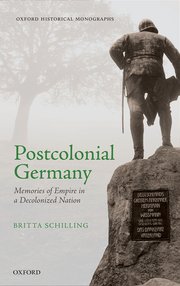Publications
Postcolonial Germany Memories of Empire in a Decolonized Nation

Britta Schilling
At the end of the First World War, Germany appeared to have lost everything: the lives of millions of soldiers and civilians, control over borderland territories, and, above all, a sense of national self-worth in the international political arena. But it also lost almost three
million square kilometres of land overseas in the form of colonies and concessions in Africa, China, and the Pacific. Allied powers declared Germany unfit to rule over overseas populations, and it was forcibly decolonized. It thus became the first ‘postcolonial’ European nation that had participated in the ‘new imperialism’ of the modern era.
The end of colonialism was the beginning of a memory culture that has been remarkably long-lived and dynamic. Postcolonial Germany traces the evolution of the collective memory of German colonialism, stretching from the loss of the colonies across the eras of National Socialism, national division, and the Cold War to the present day. It shows to what extent this memory was intimately bound to objects of material culture in the former colonial metropole, such as tropical fruit sold at colonial balls, state gifts handed to the former colonies at independence, and ethnological items kept as family heirlooms.
The study draws on a wide range of sources, including popular literature, oral history, and previously unexplored archival holdings. It marks an important shift in historical methodology, considering the significance of both material culture and private memories in constructing accounts of the past. Above all, it raises important questions about the public responsibilities of postcolonial nations and governments in Europe and their relationship to the private legacies of colonialism.
https://global.oup.com/academic/product/postcolonial-germany-9780198703464?cc=nl&lang=en&

